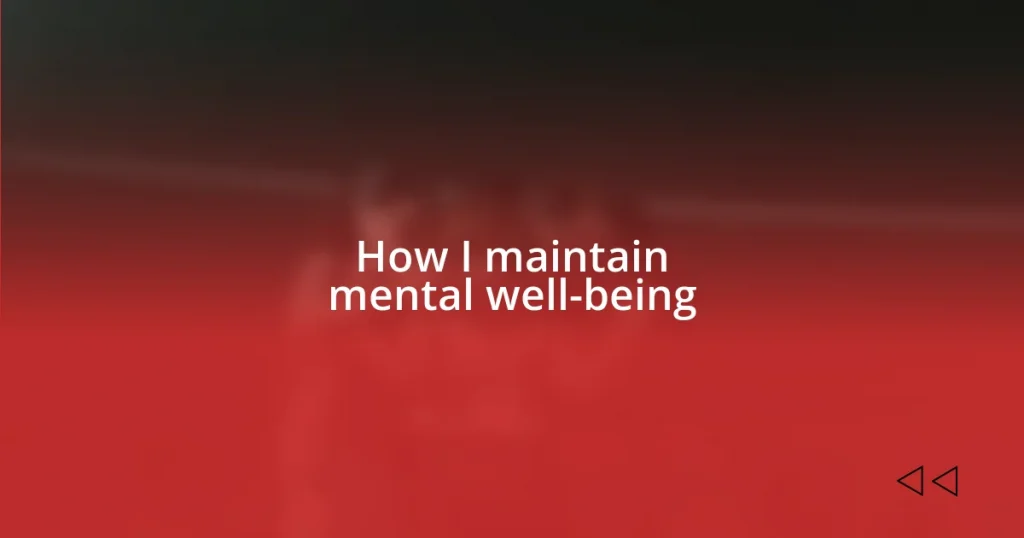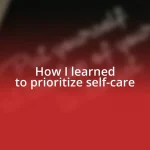Key takeaways:
- Mental well-being involves emotional, psychological, and social health, emphasizing the importance of self-check-in and positive self-talk.
- Daily habits such as mindfulness, physical activity, gratitude journaling, and setting boundaries are essential for maintaining mental health and balance.
- Strong social connections and seeking professional help play a critical role in mental well-being, highlighting the necessity of quality relationships and therapist compatibility.
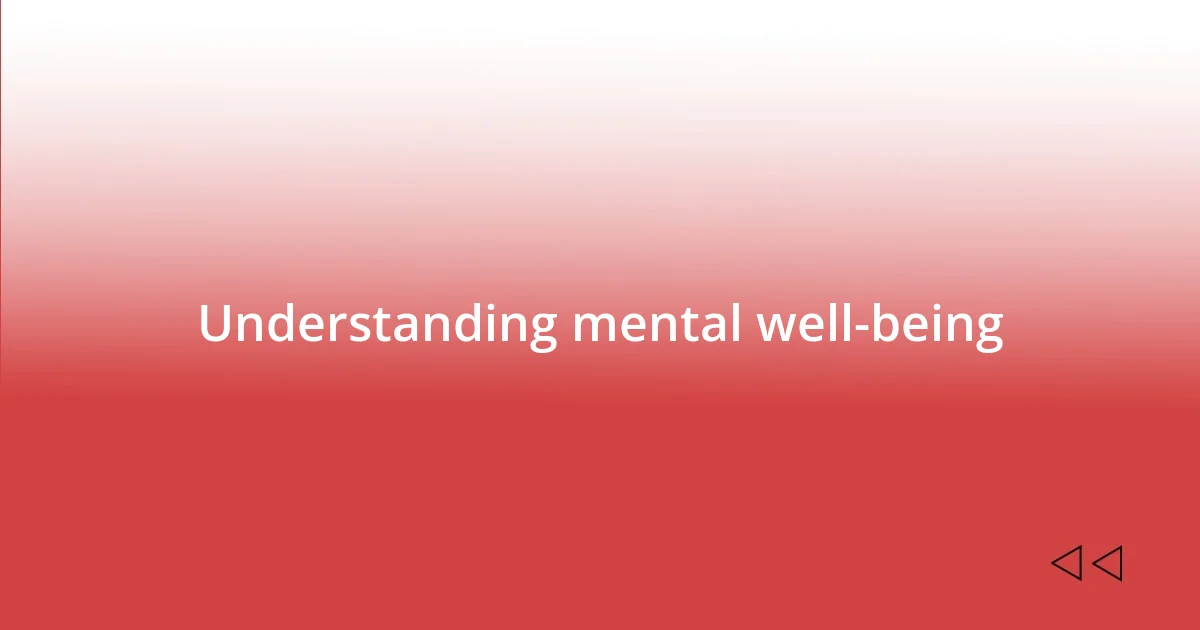
Understanding mental well-being
Mental well-being encompasses our emotional, psychological, and social health. It’s about how we feel, how we think, and how we handle stress and relationships. I remember a time when I was overwhelmed with work and personal commitments; I realized that ignoring my mental health only led to burnout. How often do we prioritize everything but our own well-being?
Understanding mental well-being involves recognizing the impact of our thoughts and feelings on our daily lives. I often find myself reflecting on how positive self-talk has transformed my perspective, especially during challenging days. Think about it: when was the last time you checked in with yourself to understand your feelings?
It’s essential to recognize that mental well-being is not merely the absence of mental illness; it’s about flourishing in all aspects of life. I cherish moments of connection with friends or enjoying a peaceful walk in nature, as they significantly boost my mood. Has it ever struck you how much a simple act of kindness or a moment of gratitude can brighten your day?
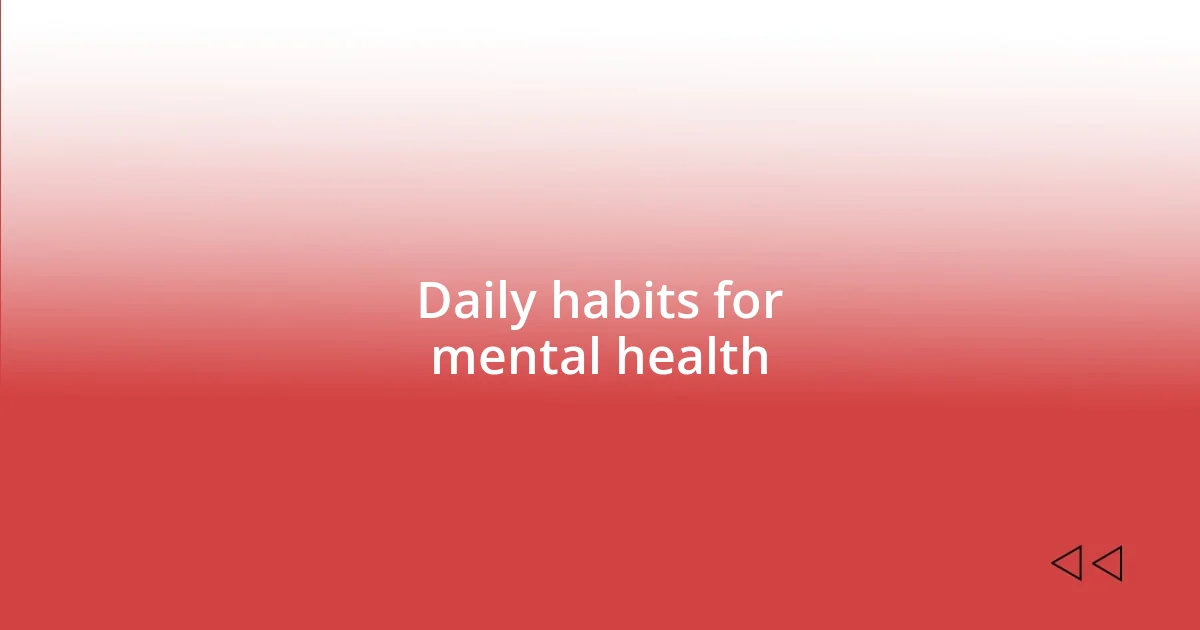
Daily habits for mental health
Incorporating daily habits into my routine has been vital for maintaining my mental health. For instance, starting my day with a brief meditation has allowed me to cultivate a sense of calm before diving into daily tasks. I recall a particularly hectic week when I committed to just five minutes of mindfulness each morning; it shifted my entire perspective on stress management. Here are some habits I’ve found beneficial:
- Morning mindfulness or meditation: Sets a positive tone for the day.
- Regular physical activity: Even a short walk can elevate my mood and energy levels.
- Gratitude journaling: Writing down what I’m thankful for helps refocus my thoughts on the positive.
- Consistent sleep schedule: Prioritizing sleep allows my mind to recharge.
- Digital detox: Taking breaks from screens helps me reconnect with myself and reduce anxiety.
Another habit I’ve integrated is setting boundaries with my time and energy. I once overcommitted and felt stretched too thin, which only led to feelings of frustration and fatigue. By saying “no” more often, I’ve been able to protect my mental space. These small changes have had ripple effects, creating a healthier balance in both my personal and professional life.
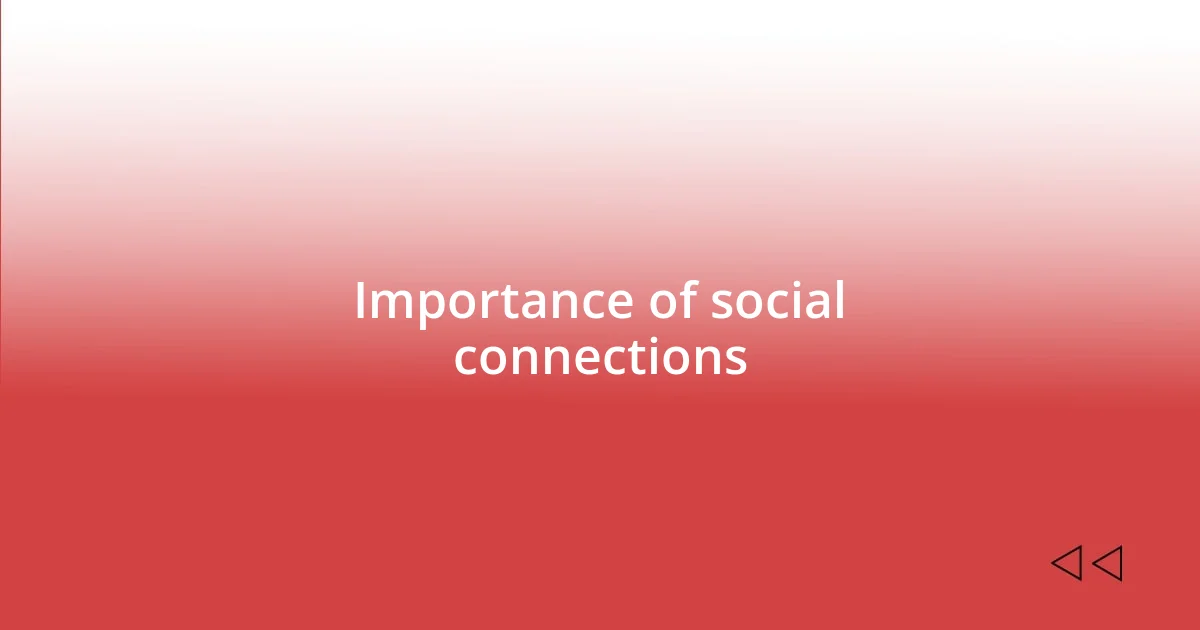
Importance of social connections
Social connections play a pivotal role in my mental well-being. When I spend time with close friends, I feel an instant lift in my mood. Have you ever felt that warmth during a friendly gathering? That feeling doesn’t just alleviate stress; it fosters a sense of belonging that is vital for mental health.
I’ve noticed that quality matters more than quantity when it comes to relationships. A deep conversation with a trusted friend often means more than a casual chat with several acquaintances. I recall a time when I felt particularly down, but a long heart-to-heart with a friend helped me gain clarity and renewed motivation. It reminds me that those who truly know us can be our greatest support system.
In my observations, the ability to share experiences and express emotions is crucial for maintaining robust mental health. I often find myself reaching out to friends during difficult times, and those moments often lead to healing laughter or valuable insights. Isn’t it incredible how just talking can lighten the load? It reinforces the notion that fostering social connections is not just a nice-to-have; it’s a necessity for thriving.
| Aspect | Individual Impact |
|---|---|
| Emotional Support | Enhances mood and reduces feelings of loneliness. |
| Sense of Belonging | Fosters feelings of acceptance and security. |
| Shared Experiences | Provides perspective, empathy, and understanding. |
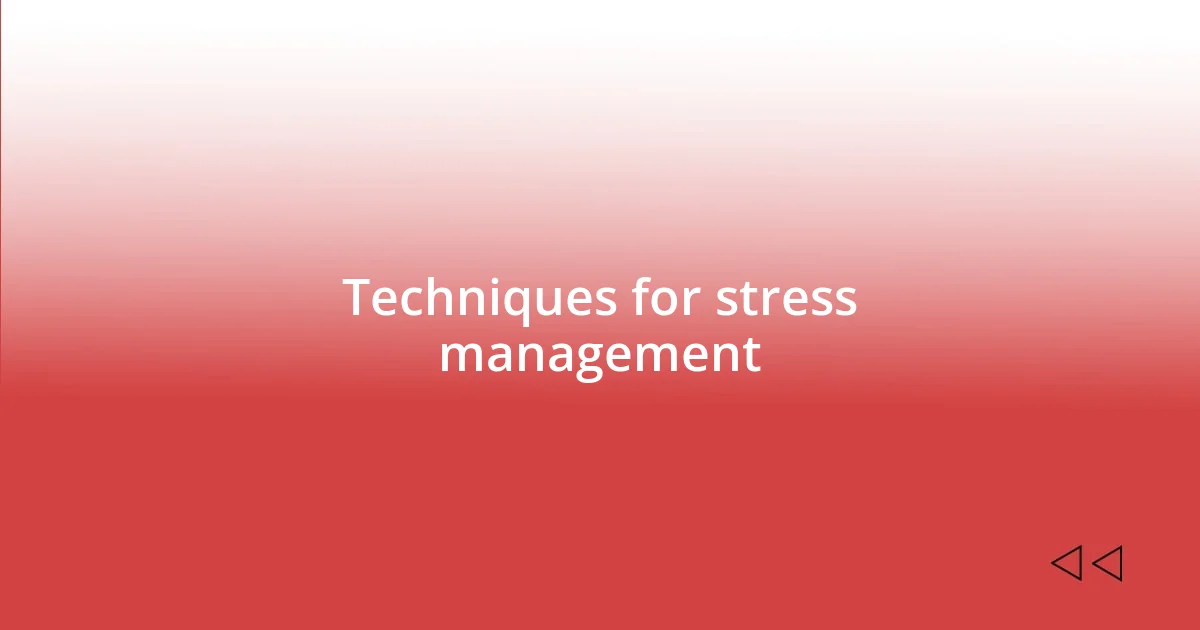
Techniques for stress management
I’ve found that specific techniques can significantly help manage stress in my daily life. One of my go-to strategies is deep breathing exercises. Whenever I feel that familiar tension creeping in, I take a moment to breathe deeply and slowly. It’s amazing how just a few minutes of focusing on my breath can reset my mind. Have you ever experienced a sudden rush of clarity after a few deep breaths? That’s the power of mindfulness in action.
Another technique I frequently use is guided imagery. I often visualize a peaceful place, like a beach or a quiet forest. During particularly stressful days, I close my eyes and imagine the sounds and scents of that setting. This mental escape provides a refreshing break and helps me regain perspective. There was a tough week at work where stress levels were high, and this practice allowed me to recharge and tackle challenges with a clearer mindset.
Lastly, I’ve discovered the immense value of movement as a stress management technique. Whether it’s a brisk walk or a dance session in my living room, physical activity has shown me how to release pent-up tension. I vividly recall one evening when I was overwhelmed with deadlines; pushing my body through a spontaneous workout made all the difference. It not only lifted my spirits but also reminded me that sometimes moving my body is the simplest yet most effective way to combat stress. Why not give it a try and see how it works for you?

Nutrition’s role in mental health
Eating well is far more than just a physical necessity; it profoundly impacts my mental health. I’ve noticed that when my diet consists of fresh fruits, vegetables, and whole grains, my mood typically stabilizes. Sometimes, I find myself cradling a bowl of colorful berries, and it dawns on me how those tiny fruits boost my energy and outlook. Have you ever considered how what you eat can influence your emotional state?
One experience that stands out for me was when I made a conscious effort to reduce processed foods. I replaced sugary snacks with nuts and yogurt, and it felt like a fog lifted. My energy levels soared, and along with that came a clearer mind. It’s fascinating how nourishing our bodies with the right nutrients—like omega-3 fatty acids found in fish—can reduce feelings of anxiety. Have you noticed changes in your mood when you adjust your nutrition?
I’m often reminded of the powerful connection between food and mental clarity. On days when I indulge in a balanced breakfast, I feel a noticeable boost in focus and motivation. It’s not just about cutting out the bad stuff, but also about incorporating those foods that nurture my brain, like leafy greens and dark chocolate. I can’t help but ask: how often do we overlook the role nutrition plays in creating a vibrant mental state? In my experience, making mindful food choices greatly enriches my overall well-being.
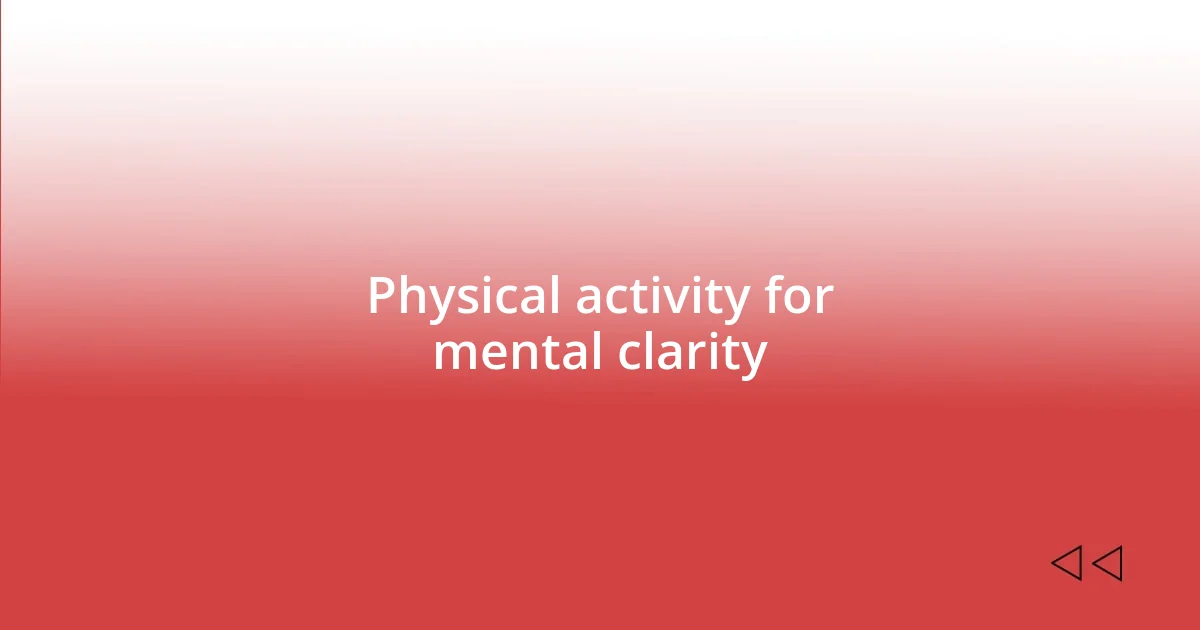
Physical activity for mental clarity
I’ve often found that physical activity acts like a reset button for my mind. Just the other day, I went for a quick jog around the park after a demanding meeting. The rhythmic pounding of my feet against the pavement had a surprising effect; with each step, I noticed my racing thoughts beginning to calm down. Have you ever felt that shift in your mindset when you immerse yourself in movement? It’s as if the world outside fades away, leaving space for clarity and fresh ideas.
One particularly hectic week, I decided to integrate daily dance breaks into my routine. There’s something liberating about dancing freely in my living room, letting the music dictate my movements. On those afternoons, I felt a burst of joy that cleared the mental fog, allowing me to tackle my tasks with renewed vigor. It’s incredible how a few minutes of joy can shine light on what once felt overwhelming. Doesn’t it make you wonder how something as simple as dancing can transform your day?
Moreover, I believe the connection between physical activity and mental clarity is undeniable. When I’m active, be it through yoga or weightlifting, I’m not only strengthening my body but also sharpening my mind. Recently, after a session of lifting weights, I sat down to review my work, and the clarity I experienced was profound. It made me realize that our bodies and minds thrive together; neglecting one can dim the other’s brilliance. How often do you prioritize movement in your day-to-day life? I’ve learned that every little effort counts, bringing not just physical strength but also mental resilience.
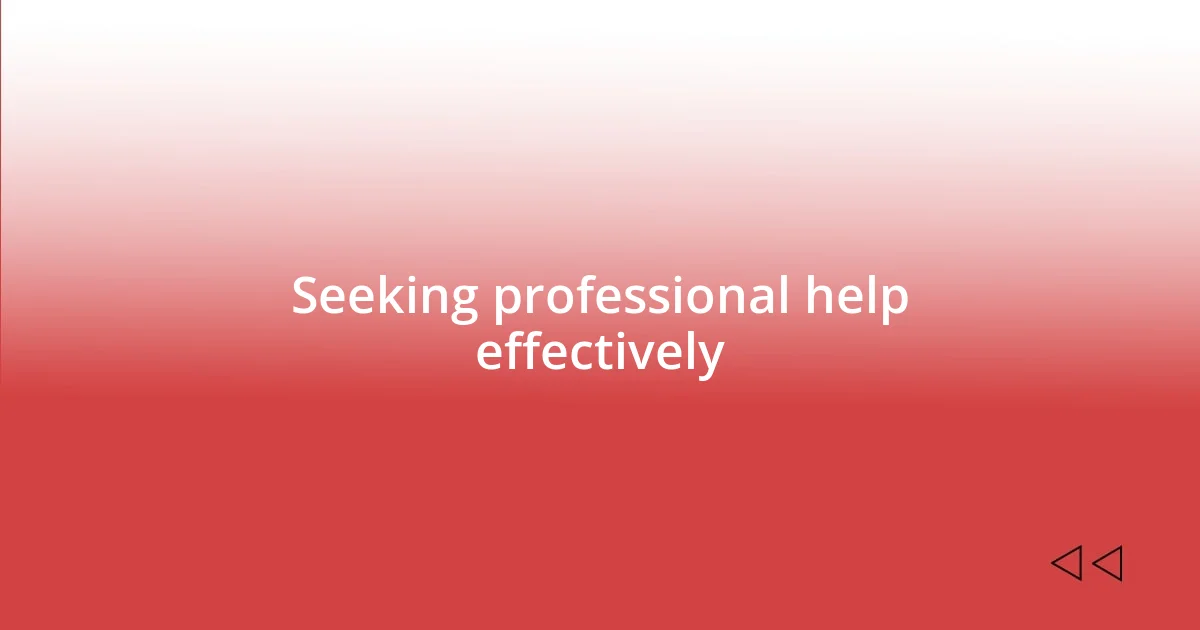
Seeking professional help effectively
When it comes to seeking professional help, I’ve learned that finding the right therapist is as crucial as the therapy itself. I vividly remember my first session; I felt a mix of hope and nervousness. I quickly realized that my comfort level with the therapist directly influenced the effectiveness of our sessions. Have you ever felt that instant rapport with someone that made it easier to open up? It’s vital to trust your instincts in this process.
An experience that stands out to me was when I switched therapists after a few months of feeling stuck. I thought it might be a huge step backward, but it turned out to be empowering. With the new therapist, I felt an immediate connection, and suddenly, my struggles began to unravel in a way that felt productive. It’s fascinating how sometimes, a fresh perspective can spark a breakthrough. Have you considered how important it is to find a professional who truly understands your unique experiences?










